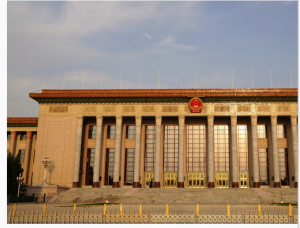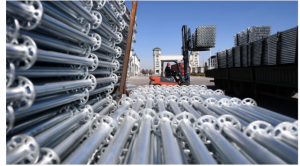China’s top legislature and political advisory body will hold the annual Two Sessions this week, after being postponed due to the COVID-19 pandemic.
What topics will be discussed at this year’s Two Sessions as the country works to offset the economic shock of COVID-19 while trying to meet a series of economic targets at this crucial moment?
Stabilizing economy
Stabilizing economy remains a top priority this year as the country is faced with a slow recovery in domestic demand and disrupted supply chains amid the coronavirus outbreak.
The country rolled out a slew of new measures to stabilize the domestic economy and help small and medium-sized enterprises (SMEs) mitigate the economic impact of COVID-19 at a meeting of the Political Bureau of the CPC Central Committee held on April 17 this year, including raising the fiscal deficit ratio, issuing special treasury bonds, increasing the scale of special bonds for local governments, and implementing targeted reserve requirement ratio (RRR) cuts.
The term “six guarantees” was first proposed at the meeting, namely, guarantee employment, the basic livelihood of the people, market order, food and energy security, the stability of the supply chains, and the operation of local government functions.
China’s GDP contracted 6.8 percent year-on-year during the first quarter of 2020, and authorities at the April 17 meeting said the challenges facing current economic development are unprecedented and difficulties, risks, and uncertainties cannot be underestimated.
 The Great Hall of the People in Beijing, China, April 29, 2020. /Xinhua
The Great Hall of the People in Beijing, China, April 29, 2020. /Xinhua
A Nomura report previewing the upcoming Two Sessions said China’s 2020 GDP growth target remains highly uncertain under the severe blow from COVID-19 and predicted that there is a 50-percent possibility that China will set its 2020 GDP growth target at 2-3 percent.
Concerning the adjustments mentioned at the April 17 meeting, this year’s Two Sessions will pay less attention to economic growth target, but focus on employment target, which is expected to remain at a high level, said Cheng Shi, managing director and chief economist at ICBC International.
“Based on current practical experiences in Tianjin Municipality, Henan Province and Zhejiang Province, measures on stabilizing employment would be announced at this year’s Two Sessions, including continuing assisting enterprises to stabilize jobs and labor relations, especially for SMEs, strengthening employment services for key groups, especially for college graduates and migrant workers, and promoting employment and entrepreneurship in multiple channels,” Cheng told CGTN.
Deepening reform
China will continue to deepen reform for a post-COVID-19 era, with efforts being made in both traditional areas like political and economic reforms, and emerging areas, including technological, internet and infrastructure reforms.
As for land reform, reform on the construction land will be the key point for the next stage. Structurally, the country will further break the barriers hindering integrated urban-rural development and activate the role of construction land in supporting farmers’ income increase, industrial establishment, and urban-rural development. In terms of efficiency, the country will accelerate the improvement of the pricing, allocation, and revenue sharing mechanism of construction land to break away from the extensive land supply, Cheng told CGTN.
For financial reform, China’s financial opening has made continuous achievements since the 19th National Congress of the CPC. It has also formed a positive “catfish effect” on internal financial reform, said Cheng.
“The country will accelerate the digital transformation of the Chinese economy. In terms of hard power, the new infrastructure will receive double supports from proactive fiscal policy and tool innovations of the capital market to accelerate the building of the industrial internet. In terms of soft power, the cultivation of the two major factors of data and technology, and the integration of Digital Currency Electronic Payment (DCEP) and real economic cycle are expected to be the focus for the next phase,” said Cheng.

A worker operates machinery equipment at a logistics enterprise in Tangshan, north China’s Hebei Province, March 30, 2020. /Xinhua
Fiscal and monetary policy
As global monetary policy enters an era of ultra-looseness, the future orientation of China’s monetary policy, and the way it is matched with proactive fiscal policy, have become the main focus.
Nomura predicted in its report that China would take an expansionary fiscal policy, with its fiscal deficit targeting 3.5 percent of its GDP in 2020 from 2.8 percent in 2019.
“Given the sharp decline in fiscal and land sales revenues, if China targets 7 percent growth in fiscal spending, we expect the actual broad fiscal deficit this year to rise to 13.1 percent of GDP from 7.1 percent in 2019,” said the report.
The report said that China’s central bank is expected to launch large-scale stimulus measures as part of the financial support during the Two Sessions.
The possibility of lowering the benchmark deposit interest rate is decreasing, and the central bank may be more inclined to inject liquidity into the market through more flexible measures such RRR cuts and various lending facilities (such as MLF and re-discounting) to help lower the lending rate, said the report.
“On monetary and credit policy, China may reiterate its requirement for keeping M2 and outstanding aggregate financing growth reasonably higher than nominal GDP growth, guiding down financing costs for the real economy and providing more credit supply for SMEs that have borne the brunt of the COVID-19 shock,” said the report.
“Recent economic data shows that the current pressure has shifted from inflation to deflation, so the monetary policy space is expected to expand. Therefore, China’s monetary policy is expected to be flexible and timely. The central bank is expected to launch two or more rounds of RRR cuts in due course,” said Cheng.
By Heather Hao
Courtesy: Cgtn.com
 Africa -China Review Africa -China Cooperation and Transformation
Africa -China Review Africa -China Cooperation and Transformation